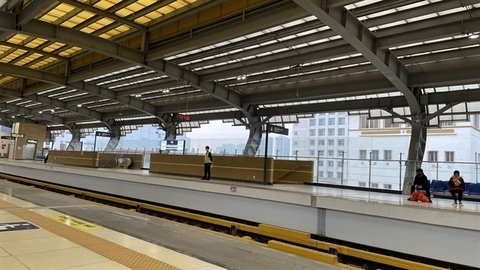
A new residential complex is under construction in Thanh Xuân District, Hà Nội. — VNS Đoàn Tùng
In light of a resource shortage for Hà Nội's development, economic experts are calling for the implementation of specialised mechanisms to revolutionise the mobilisation of funds beyond the budgetary constraints.
Vũ Đình Anh, an economist from the Hà Nội's budget department, said there is a stark limitation in the capital city's financial capabilities. The department estimated the city's current revenue stands at VNĐ352.9 trillion, with only a fraction of this amount, over VNĐ99 trillion, being allocated to the local budget. A mere VNĐ36.5 trillion was exclusively designated for the local budget. At the same time, over VNĐ62.6 trillion was funnelled into the central budget, retaining a meagre 32 per cent, in comparison to HCM City, the largest city in southern Việt Nam, at 21 per cent.
The projected balanced local budget for 2023 paints a grim picture for Hà Nội, totalling a mere VNĐ99.9 trillion, including VNĐ728.7 billion in surplus from the local budget. This was dwarfed by HCM City's equivalent estimate, surpassing Hà Nội's by more than ten times at VNĐ9,316 billion.
The supplementary budget estimate from the central budget for the capital city in 2023 stands at a paltry VNĐ5,170 billion, representing just a third of HCM City at VNĐ15,606 billion.
"The financial policy mechanisms and resources allocated to the capital are limited, far below the city's development needs under normal conditions, not to mention the implementation of Hà Nội's planning until 2030 with a vision until 2050. Even compared to the special preferential mechanisms and policies for HCM City stipulated in Resolution 98/2023/QH15, the mechanisms and policies for the capital city are disproportionately low," he said.
The amended Draft Capital Law offers provisions in Chapter IV, from Article 37 to Article 45, addressing the need to attract investment resources for the capital city's multifaceted development. These provisions underscore the importance of decentralisation in investment, streamlining investment procedures, and introducing incentive measures to attract social and state budget investments. The focus is on optimising land use and assets to align with the city's vision of becoming a green, smart, and modern city.
Implementation of these regulations is seen as a crucial step in translating the development policies for the capital city into actionable initiatives. The proposed measures draw inspiration from successfully implemented schemes in central Khánh Hòa City and HCM City, involving strategies such as separating compensation and clearance projects, promoting public-private partnerships, and embracing build-transfer (BT) models and strategic investments.
Financial autonomy
Dr Lê Duy Bình, CEO of Economica Vietnam, expressed optimism regarding the impact of proposed decentralisation and empowerment regulations on Hà Nội's investment capital and budget. He said these measures, if adopted, would not only comply with existing regulations but also help the city assume a proactive approach, unlocking the city's untapped potential.
A recent survey has revealed a broad consensus among economic experts regarding the draft's content related to financial resources and their utilisation in the capital city. The emphasis is on Hà Nội uniqueness, advantages, and alignment with relevant legal provisions.

View inside of the Láng Station of the Hà Nội Urban Railway. VNS Mai Hương
Nguyễn Sĩ Dũng, former Vice Chairman of the National Assembly Office, recommended adopting a complementary model for Hà Nội, where areas and tasks within the city's capabilities are delegated to the local authorities for execution. This model envisions the city independently managing responsibilities such as economic development, culture, education, health, planning, and licensing without seeking higher-level approvals, thereby enhancing efficiency and saving time.
"The decentralisation of administrative power must go hand in hand with financial decentralisation. This means empowering Ha Noi to have its own sources of revenue. In addition, with the allocated resources from the Central Government, there is a need to increase the right to self-manage by deciding how to spend it, which is the responsibility of the Ha Noi government," Dũng said.
Anh said that the state budget serves as a catalyst for resources outside the budget, encompassing both domestic and foreign investments. To mobilise diverse resources effectively, the city must implement unique mechanisms to attract investments from domestic and foreign investors, which involves coordinating state budgets and off-budget resources.
Despite being the only locality in the country with its unique laws, Hà Nội has been facing challenges in the specificity of current regulations. He suggested that to take advantage of the Capital Law successfully, it is imperative to issue decrees related to finance, taxes, or specific issues such as sidewalk use fees.
NA Deputy Đỗ Thị Lan advocates for the utilisation of the city's surplus salary reform fund, earmarking it for infrastructure investment and ensuring a capped increase in income for officials and civil servants, which must not exceed 0.8 times the country's basic salary, in line with the current salary reform policies.
NA Deputy Đoàn Quang Ninh said there is a need for alignment between draft law regulations and existing resolutions, emphasising a cohesive approach to salary reform. The delegate underscores the urgency of crafting specific policies for the capital city to ensure immediate income increases for officials and civil servants during the formulation of the salary reform policy. — VNS